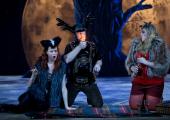theartsdesk in Rome: Abbado, Shakespeare and Santa Cecilia
The world's greatest living conductor achieves miracles with a Roman orchestra already on top form
Many of Italy's artistic institutions may have tottered or crumbled during the Berlusconi years, and the more capable new man in the Palazzo Chigi can only offer painful sticking plaster, yet one major orchestra has never sounded better.









